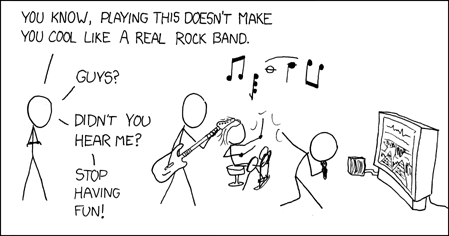Drolyt, thanks for the explanation. In all honesty, I have already understood the objection some people around here have with the concept. And I dont deny its a very different beast from D&D. The best words to describe this difference come from the very author of AW, I think, when he says that roleplaying is basically a conversation between the participants, when the player have sucess at what they want, they describe it and have it, and when they fail, the GM describe what he wants to happen for the situation.
In other words, AW mechanics work on a fiction level, while D&D mechanics work on a math/numbers one. So I agree when you say AW give a kind of authorial power to the player, at the same time that depends on the GM for adjudicating its resolutions. And I think both approaches are equally valid ans have its advantages and disadvantages.
What I find bizarre is how the people around here bashing the AW concept forget that the same kind of critics can be applied to D&D concept, because as yourself pointed out, its not chess, it depends on the GM to also adjudicate the whole world and everything inside it.
The difference is that the D&D model (task-resolution) gives the player total agency on the micro level, but takes it all from him and gives to the GM on the macro. While AW model (conflict resolution) gives both player and GM a kind of shared agency on both micro and macro levels. So, the BEAR ATTACK criticism is equally valid for both models, because while its allowed on the micro level in AW its also allowed in D&D on a macro level. Eg:
A character lockpicking a door to reach the treasure:
On AW, if he rolls a weak-sucess/sucess at a cost/ugly choice, the GM says "Ok, you open the door, but then you see there is this huge POLAR BEAR inside guarding the treasure." And if he has a clean sucess, the GM says: "Ok, you open the door and get inside the treasure room safely".
On D&D, he rolls a sucess for picking the lock and the GM says "Ok, you did it". But then the player agency ends, and now its all in the GM hands, and he can do what he wants, like for eg: ".. But then you open the door and see this huhge POLAR BEAR inside guarding the treasure".
See? D&D is so prone to POLAR BEARS as AW. The difference is one of scale. You prefer having total agency on a micro-scale while having none on a macro ( D&D) or sharing agency with the GM on both scales (AW) ? As I said, as with everything its a matter of personal preference and/or themes and situations. But the fact is: D&D is also prone to polar bears. And you are spot-on on the reason - its not chess.

(the irony is that AW has rules in place to guarantee that the GM will keep the game player-driven all the time, while D&D dont thus being much more prone to a railroady GM )
